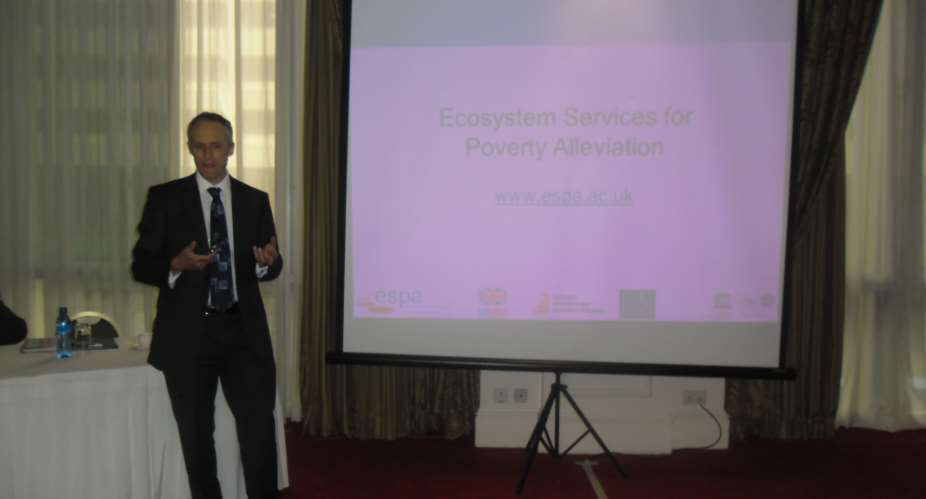Over 30 environmental researchers and beneficiaries early June gathered in Nairobi and Mombasa to assess the role ecosystems can play, to alleviate poverty and how best the research can be utilized in grassroots communities to have more impact.
Organized by the African Centre for Technology Studies (ACTS) and the Ecosystem Services for Poverty Alleviation (ESPA) the workshop drew researchers from UK, Zambia, Uganda, and Kenya who shared their studies on how ecosystems can be tapped sustainably to improve livelihoods.
The researchers were drawn from disciplines like agriculture, tourism marine and fisheries, dry lands, forestry, plants and livestock. There also were grassroots representatives from beach management units and Community Based Organizations to give their views.
According to the Director of ESPA, Professor Paul Van Gardingen it's vital to make better use of research to create sustainable links between services provided by the environment and how they can reduce poverty among communities.
Projects showcased in the 3 day workshop are among the 70 research projects EPSA has funded, involving 500 researchers and from 25 countries worldwide since inception in 2010. Lately 6 more projects have been funded to the tune of 10.2 million pounds within Eastern and Southern Africa.
ACTS executive director Dr Bernard Muok lauded ESPA's by noting their environmental work ensures communities take ownership of forests conservation after learning the diverse benefits they can get from conserving ecosystems, as opposed to viewing conservation, as government's responsibility.
'It's not only about timber or wood but the air we breathe and soil are other services forests provide us,' said Dr Muok at the workshop in Mombasa. He observed the gathering of diverse stakeholders at the workshop would help in strong decisions being made.
At the Nairobi workshop Professor Paul gave a brief overview of some of the ESPA projects around the world and lessons learned. He cited a bio-fuel Jatropha project in Zambia that failed and through ESPA's intervention, salvaged and turned into a profitable soap making and selling ecosystem venture. 'It's an example of how you can think differently and do better,' said Professor Paul. He also cited a community in Bangladesh that for the last 10 years, had been hit by two cyclones the last being 6 years ago.
'We need to prevent ecosystems from getting to a point where they are so degraded they are no longer resilient.' cautioned Professor Paul. From the Bangladesh case he challenged researchers present to figure out how their research can improve such people lives.
In regions where ecosystem conservation may not be embraced, Professor Paul expressed the need for linking ecosystem services projects to social objectives. He cited 2 EPSA projects in Bolivia in a watershed area where communities get monetary incentives by conserving.
The communities are now engaged in bee keeping and through those projects resistance to REDD related issues are diminishing with the government taking an active role.
Grassroots research beneficiaries present also gave their views. Omar Abdallah Juma Wasini Beach Management Unit secretary challenged the researchers to also ensure findings, are translated to Swahili, so older people in the community who are committed but can't understand English can utilize it. John Kinyanjui a fisherman in Lamu lauded the research, but said it needed to be availed to communities through CBOs to implement it.
The issue of tradeoffs was a recurring theme in the workshop. The question was how best to balance the tradeoffs, for communities living near forests or marine environment. Researchers at the workshop explored various scenarios with ESPA modeling tools of how economic gains can be made without causing much damage to ecosystems. 'If you maximize one ecosystem service it could be at the expense of another, it's difficult to balance tradeoffs,' observed Dr Tim Daw of the University of East Anglia UK.
The meeting concluded with a call to researchers to pinpoint the best technocrats within the government, private sector and non government organization that if approached, with research can use it optimally at the grassroots.
Professor Paul also gave an overview of what next for ESPA in the next year. Among them was funding small research projects linked to past ones to the tune of 100,000 to 200,000 pounds. He also alluded to an IT platform in the pipeline to enable researchers from Africa, South East Asia and Latin America to share knowledge.





 We’re disappointed over gov’t’s lacklustre attitude to negotiations of our condi...
We’re disappointed over gov’t’s lacklustre attitude to negotiations of our condi...
 No more Buffer Stock as Mahama promises to decentralise SHS food supply
No more Buffer Stock as Mahama promises to decentralise SHS food supply
 NSS urges President Akufo-Addo to sign National Service Bill into law
NSS urges President Akufo-Addo to sign National Service Bill into law
 You're lying, your 7-11pm dumsor attributed to overloaded transformers is false ...
You're lying, your 7-11pm dumsor attributed to overloaded transformers is false ...
 Consult Council of State on anti-gay bill – Mahama advises Akufo-Addo
Consult Council of State on anti-gay bill – Mahama advises Akufo-Addo
 Transport Ministry has no power to determine fares – COPEC
Transport Ministry has no power to determine fares – COPEC
 Brace yourselves for more economic hardship – Prof Adei to Ghanaians
Brace yourselves for more economic hardship – Prof Adei to Ghanaians
 Any government depending on IMF is likely to fail – Grand Coalition
Any government depending on IMF is likely to fail – Grand Coalition
 Ghana risks losing premium cocoa position due to galamsey – COCOBOD laments
Ghana risks losing premium cocoa position due to galamsey – COCOBOD laments
 Akufo-Addo launches NSS policy document to tackle under-utilisation of service p...
Akufo-Addo launches NSS policy document to tackle under-utilisation of service p...
